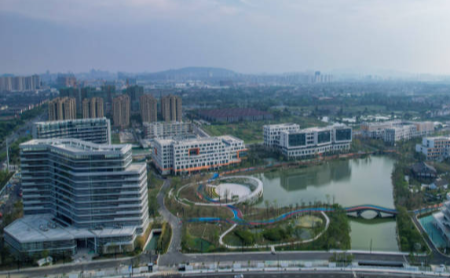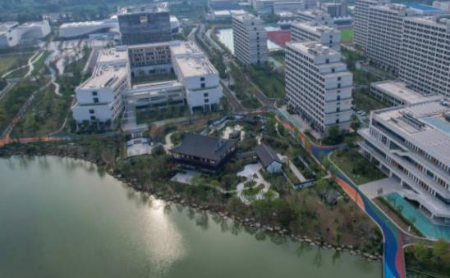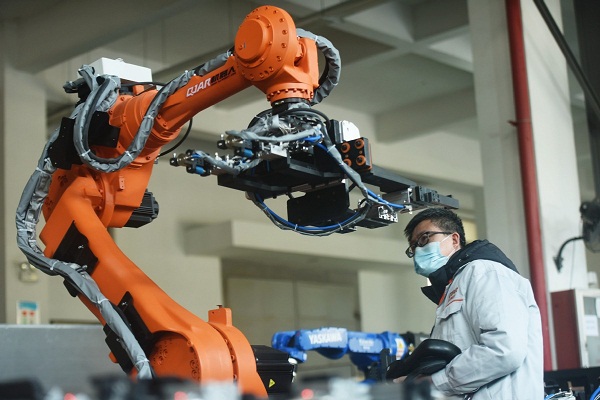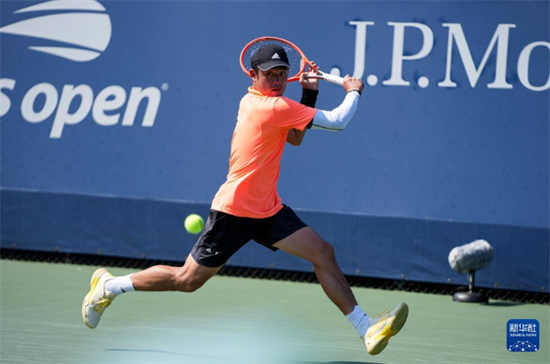Trending sport goes viral for social aspect, less physical contact, fun competition, aiming for bigger market share
When a group of college students started their flying disc business back in 2008 in China, few of them could imagine the then little-known sport would have such a big popularity spurt across the country this summer, or that their company would grow to become among the best-of-class in China.
Flying discs are known throughout most of the world by the registered trademarked name “Frisbee”.It is a recreational and competitive sport that originated in the US and is now increasingly finding favor among Chinese consumers.
“It was a very niche market and we founded it merely based on the enthusiasm towards the sport rather than the idea of making a bunch of money. Luckily, the sport developed so rapidly in the past decade and saw a popularity boom this year. We are eyeing over 100 percent in revenue growth by the year-end to reach about 100 million yuan ($14.49 million) despite uncertainties from the COVID-19 pandemic,” said Xu Yingfeng, founder and CEO of Yikun Discs, headquartered in Hangzhou and Ningbo, Zhejiang province.
As of mid-August, players posted over 510,000 customer reviews about playing the sport on Xiaohongshu, a major lifestyle-sharing platform in China, and the activity became a trending topic several times on social media platforms like Weibo and Douyin. The posts, using vivid descriptions, well-taken pictures and videos, as well as a large number of interactive comments, went viral and soon spread to other platforms.
Posters and followers used words like happy, trendy, interesting, competitive, free, fat-burning, exciting and cool to describe the sport.
A research institute under media agency 36kr said flying disc games now surpass skateboarding, cycling and other sports to become one of the most popular sports among young people, with about 60 percent of people surveyed saying they tend to make new friends and expand their social circles through playing the game.
According to the Chinese Flying Disc Administrative Committee, about 500,000 people in China participated in flying disc sports last year, creating a market value surpassing 80 million yuan. Data from Tianyancha, a Chinese corporate information provider, showed that over 120 companies whose businesses are related to the sport are registered in China as of June.
Beijing-based 32-year-old Cheng Jin is a fan of flying disc games. “It’s getting hard to make new friends at my age when all of my time is spent either on work or the family. Playing it is a good way to expand my social circle as my friends engaged in the game would invite their friends. The more, the merrier.”
“In addition, the sport is quite easy, so I don’t need to spend a lot of time and energy learning about the rules or the skills to enjoy it. It is also quite safe to play as the sport barely requires physical contact,” she said.
The report said about 47 percent of the post-90s generation surveyed said they are interested in the sport, which is the highest proportion among all age groups. Roughly 44 percent of the post-85 generation surveyed showed interest in the sport, and 27 percent of the post-00s generation surveyed liked to play flying disc sports.
Expanding to all age groups, a recent report by iiMedia Research showed about 81.2 percent of the 1,442 respondents surveyed have participated in flying disc games. Among them, 50.8 percent of people have played it for one and a half years, while 26.1 percent of people have played for half a year.
Involving social interactions, less physical contact and high customer stickiness are key factors that the iiMedia report attributes to the game’s increasing popularity in China.
The number of people who participated in flying disc sports twice a week accounted for the largest proportion, reaching 42.8 percent. Among them, 61 percent said they spent about 60 minutes in each round of a game, according to iiMedia Research.
With the sport gaining increasing popularity in China, the sport is demonstrating higher commercial value.
“Not only are customers willing to spend money on regular sports equipment like discs, gloves, shoes and other equipment, they are also spending money on clubs and competitions and will even pay big money to hire professional photographers to take photos for social media posts,” Xu said.
The 36kr report said that young people’s average annual spending on the trendy sport is more than 6,500 yuan, and 10 percent of young people surveyed spend an average of 10,000 yuan on the sport every year.
“I spent about 30 yuan on my first disc. Just a few weeks later I changed it to a fancier one which cost me about 150 yuan. When I first started playing the sport, my friends and I would find random grassy areas, but now we tend to rent a football pitch that costs about 2,000 yuan for two hours. Sometimes we even hire professional photographers for better photos for our social media posts,” Cheng said.
According to iiMedia Research, the growing popularity of the sport also promotes the development of related industries with a market value totaling 86.77 billion yuan. It estimates that the scale of the flying disc and related industries in China will continue to grow, and the growth rate will accelerate in the next six years.
“Although it seems like the sport gained sudden popularity this year, it’s a result of many years of efforts from those in the industry. The situation was quite different just about a decade ago, which was also the first few years when we started the business. At that time, we had no market and lacked professionals and sufficient funding. Not a lot of people even knew about the game. They thought it was for pets,” Xu said.
“Many people persuaded us not to get into the business because there was barely a market for it, and not doing it seemed to be a rational choice for me. My parents also had concerns as it was such a niche market, not to mention I had to quit a decent job at a bank to start the flying disc business,” he said.
The first step Xu and the other co-founders took to run their business was to innovate discs and send their products to professional players, teams and clubs for reviews for further improvements.
“At that time, good discs on the market were imported from Western countries like the United States. We wanted to make our own products and we succeeded in it. Now our products are even sold to the US and the United Kingdom,” Xu said.
Last year, Yikun’s export of discs surged nearly 200 percent year-on-year and came close to 50 million yuan, accounting for over 80 percent of the company’s total revenue, which stood at about 60 million yuan.
The company’s products also won the most recognition among domestic consumers. About 49.7 percent of consumers surveyed knew about Yikun’s products, followed by Decathlon which was 41.5 percent, according to the iiMedia report.
The next step was to figure out ways to promote the sport to a wider range of players. Xu and his colleagues made efforts to introduce the sport to schools, camps, tourist agencies and clubs, and made attempts to hold professional competitions.
“In the past decade, there were a growing number of clubs, camping organizers and sports teams from colleges to promote the flying disc sport to a wider range of audiences. Today, the sport is seen not only in colleges but also in parks, playgrounds and even in elderly gatherings. Discussions about the sport have also spread from blogs to different forms of social media platforms like short and long video sharing platforms,” Xu said.
Ge Yue, co-founder of the Starry Woods Camp in Chongqing, introduced the sport to the camp she managed back in 2017.
“Back then, I was a project manager at another educational camping company. Children love the sport as they can run, throw, catch, or avoid discs with many other kids. It is a highly interactive sport that involves both boys and girls but is very less likely to see confrontations or conflicts during a game. It is also easy for us to start a flying disc game as it has no specific requirements on places or judges. All you need to do is to find a playground,” she said.
The increasing popularity of the activity has drawn attention of the government. In 2019, the Asia Oceanic Ultimate and Guts Championships was held in Shanghai with government support, marking the first time that China held a global-level competition in the sport.
In July, the General Administration of Sport announced China’s first flying disc tournament starting in August, with a series of competitions being held in cities including Beijing, Shanghai and Hangzhou, and the final competition to be held in May next year.
“With flying disc officially becoming an option in physical education classes for elementary and middle schools, we are confident that the sport will have a bigger market going forward. We are lucky to witness the sport’s development in the past few years and to tap the growing consumer demand,” Xu said.









